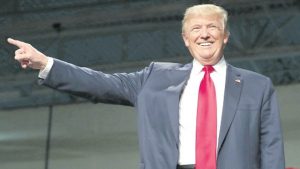 WASHINGTON, DC, USA (AP) — The military parade for Donald Trump has come early. Two months before Inauguration Day festivities, an extraordinary number of recently retired generals, including some who clashed with President Barack Obama’s Administration, are marching to the president-elect’s doorstep for job interviews.
WASHINGTON, DC, USA (AP) — The military parade for Donald Trump has come early. Two months before Inauguration Day festivities, an extraordinary number of recently retired generals, including some who clashed with President Barack Obama’s Administration, are marching to the president-elect’s doorstep for job interviews.
It’s not unusual for an incoming administration to consider a retired general for a top position like CIA director. But Trump has turned to retired officers so publicly and in such large numbers that it raises questions about the proper balance of military and civilian advice in a White House led by a commander-in-chief with no defence or foreign policy experience.
The tilt toward military officials may reflect a limited pool of civilian options. Many officials from previous Republican Administrations politically disowned Trump during the campaign, calling him unqualified. And Trump suggested he wouldn’t want many of them, as he vowed to “drain the swamp” by running establishment figures out of town.
Robert Goldich, a retired government defence analyst who has watched administrations for 44 years, says Trump’s focus on retired generals might be unprecedented.
The only one announced for a top job thus far is Michael Flynn, a retired three-star army general. Trump appointed Flynn as his national security adviser, a post that does not require Senate confirmation but is central to a president’s decision-making process. Flynn was forced out as Defence Intelligence Agency director in 2014. Afterward, he strongly criticised the Obama Administration’s approach to fighting the Islamic State group and threw his support to Trump.
Among others under consideration are two retired four-star Marine generals — James Mattis for defence secretary and John Kelly for homeland security secretary. Other names surfacing include retired Army General Jack Keane and David Petraeus, the retired four-star general who was Obama’s CIA director in 2011-12 before resigning amid disclosure that he had an affair with his biographer and shared highly classified information with her.
In remarks to
The New York Times on Tuesday, Trump spoke about the Pentagon post in ways that offer insight into why he is attracted to former generals like Mattis.
“I think it’s time maybe, it’s time for a general,” Trump said, suggesting he favours a military mindset. “Look what’s going on. We don’t win, we can’t beat anybody.”
Kelly retired this year after a storied career capped by commanding the US Southern Command, where he differed with the White House over closing the Guantanamo Bay prison and expressed doubts about the administration’s moves to open all combat jobs to women.
Bing West, a Vietnam War veteran and former assistant secretary of defence, said Trump’s outreach to retired generals is wise.
“Our country is fighting a long war. It’s common sense to seek the experience of those who have proven they know how to fight,” he said in an email exchange.
The concern about undue military influence derives from a long US tradition of civilian control of the military, which is the basis for a ban on active-duty officers running the Pentagon. The Constitution affirms civilian control by making the president the commander-in-chief and giving Congress the authority to declare war and fund the military.
The appointment of too many generals to high civilian positions could prompt fears that Trump is on a path to militarising US foreign policy or giving the military too much sway in decisions about war and peace.
But that view was rejected by Richard Fontaine, president of the Center for a New American Security, a Washington think tank. In an interview, he noted that it was President George W Bush’s civilian advisers who pushed hardest to launch the 2003 Iraq invasion.
